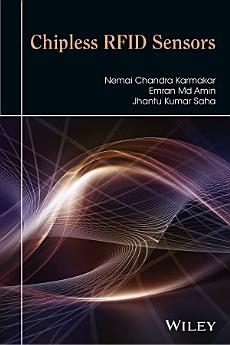Chipless RFID Sensors
Informazioni su questo ebook
This book presents various sensing techniques incorporated into chipless RFID systems. The book is divided into five main sections: Introduction to Chipless RFID Sensors; RFID Sensor Design; Smart Materials; Fabrication, Integration and Testing; and Applications of Chipless RFID Sensors. After a comprehensive review of conventional RFID sensors, the book presents various passive microwave circuit designs to achieve compact, high data density and highly sensitive tag sensors for a number of real-world ubiquitous sensing applications. The book reviews the application of smart materials for microwave sensing and provides an overview of various micro- and nano-fabrication techniques with the potential to be used in the development of chipless RFID sensors. The authors also explore a chipless RFID reader design capable of reading data ID and sensory information from the chipless RFID sensors presented in the book. The unique features of the book are:
- Evaluating new chipless RFID sensor design that allow non-invasive PD detection and localization, real-time environment monitoring, and temperature threshold detection and humidity
- Providing a classification of smart materials based on sensing physical parameters (i.e. humidity, temperature, pH, gas, strain, light, etc.)
- Discussing innovative micro- and nano-fabrication processes including printing suitable for chipless RFID sensors
- Presenting a detailed case study on various real-world applications including retail, pharmaceutical, logistics, power, and construction industries
Chipless RFID Sensors is primarily written for researchers in the field of RF sensors but can serve as supplementary reading for graduate students and professors in electrical engineering and wireless communications.
Informazioni sull'autore
Dr. Nemai Karmakar obtained his PhD in ITEE from the University of Queensland, Australia, in February 1999. In 2004, Dr. Karmakar formed the RFID and Antenna Research Group at Monash University, Australia. Dr. Karmakar is a pioneer in fully printable chipless RFID tags, readers, signal processing, and smart antennas. He has published extensively in the field, authoring and co-authoring more than 350 scientific journal and conference articles, 8 books, 35 book chapters, and 9 patent applications.
Dr. Emran Md Amin obtained his PhD from the Electrical and Computer Systems Engineering Department of Monash University in May 2015. He was a visiting researcher at the Auto-ID Lab, Massachusetts Institute of Technology (MIT). His research areas include chipless RFID sensors using electromagnetic metamaterial structures, smart materials for RF sensing, and thin film sensing for biomedical applications.
Dr. Jhantu Kumar Saha obtained his PhD from the Saitama University, Japan, in March 2008. Before joining Monash University, he completed his post-doctoral research in the Japan Science and Technology Agency (JST), University of Toronto, Canada, and Swinburne University of Technology, Australia. His research areas include thin-film growth methods and characterization techniques, and nano-fabrication techniques of solar cells and sensors.





